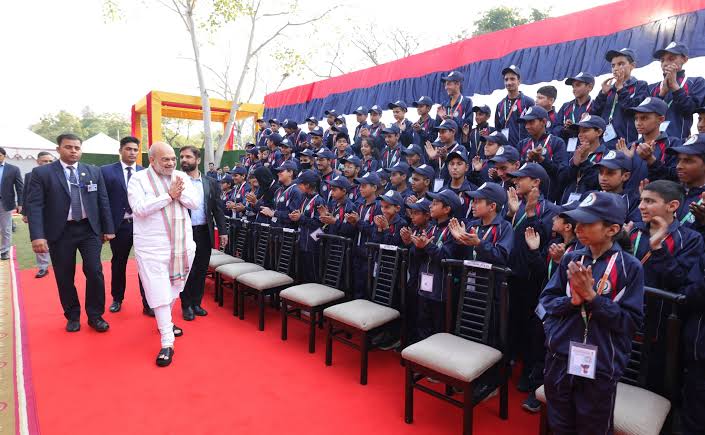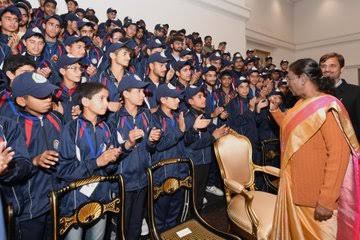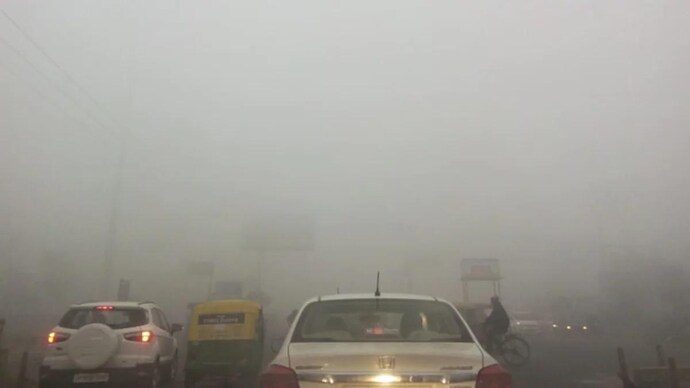Union Home Minister Amit Shah recently engaged with 250 children from Jammu and Kashmir as part of the ‘Watan Ko Jano’ program in New Delhi. This initiative aims to introduce the youth of Jammu and Kashmir to the country’s vast social and cultural diversity, fostering a deeper emotional connection with the nation. The program has been instrumental in helping children from the region explore the rest of India, understand its progress, and integrate with the broader social fabric.
 During the interaction, Amit Shah emphasized the importance of national unity and highlighted the transformation that Jammu and Kashmir has undergone in the past decade. He credited Prime Minister Narendra Modi’s leadership for the abrogation of Article 370, which he described as a crucial step in ensuring equal rights for the people of Kashmir. Shah reassured the children that they are as much a part of India as those from any other state, emphasizing that the nation belongs to them as well.
During the interaction, Amit Shah emphasized the importance of national unity and highlighted the transformation that Jammu and Kashmir has undergone in the past decade. He credited Prime Minister Narendra Modi’s leadership for the abrogation of Article 370, which he described as a crucial step in ensuring equal rights for the people of Kashmir. Shah reassured the children that they are as much a part of India as those from any other state, emphasizing that the nation belongs to them as well.
The Home Minister spoke passionately about the strides made in development, peace, and stability in Jammu and Kashmir. Over the last ten years, incidents of terrorism, stone-pelting, and bomb blasts have seen a sharp decline, while economic and infrastructural advancements have gained momentum. Education, industry, healthcare, and public infrastructure have all improved significantly. Notably, the region now boasts the world’s highest railway arch bridge, Asia’s largest tunnel, and India’s only cable suspension bridge. Additionally, Jammu and Kashmir is home to two AIIMS institutions, two IIMs, eight universities, and 24 major colleges, reflecting the government’s commitment to enhancing educational opportunities.
Shah underscored that peace is the cornerstone of development and that violence only leads to destruction. He expressed concern over the thousands of lives lost in past decades due to terrorism and reiterated the government’s goal of ensuring that not a single person in Jammu and Kashmir falls victim to such violence in the future. The responsibility of maintaining peace, he said, rests not only with the government but also with the youth. He urged the children to take the message of peace and harmony back to their families and communities, emphasizing that true progress can only be achieved when people collectively reject terrorism and embrace unity.
In a heartfelt message, Shah assured the children that they are the future of Jammu and Kashmir and that their voices and actions will shape the destiny of the region. He encouraged them to spread the message of peace in their villages and among their peers, fostering a new era of development and stability. According to Shah, if every child in the region convinces their families and neighbors to reject violence and embrace unity, there will be no need for armed forces or law enforcement to maintain peace.
The ‘Watan Ko Jano’ program, organized by the Social Welfare Department of the Government of Jammu and Kashmir in coordination with the Ministry of Home Affairs (MHA), has played a significant role in this vision. The children participating in this year’s program, including 62 girls and 188 boys aged 9 to 18, have traveled to Jaipur, Ajmer, and Delhi, visiting historical landmarks and meeting key dignitaries. They explored sites like Qutub Minar and the Red Fort, gaining firsthand exposure to India’s rich heritage and development. Their journey began on February 15 and will conclude on February 27 when they return home with new experiences and broader perspectives.
The Ministry of Home Affairs, under the leadership of Prime Minister Modi and Home Minister Shah, remains committed to initiatives like ‘Watan Ko Jano’ that aim to empower and integrate the youth of Jammu and Kashmir. The program specifically selects children from vulnerable backgrounds, including those affected by terrorism, orphans, and economically disadvantaged students. It provides them with an opportunity to witness India’s progress and instills in them a sense of belonging and aspiration.
Since its inception, approximately 2,868 children have participated in the program, each returning with a renewed sense of hope and a deeper understanding of their place in the nation. As these children return to their homes, they carry with them not just memories of their travels but also a mission—to build a Jammu and Kashmir that thrives in peace, progress, and unity.


